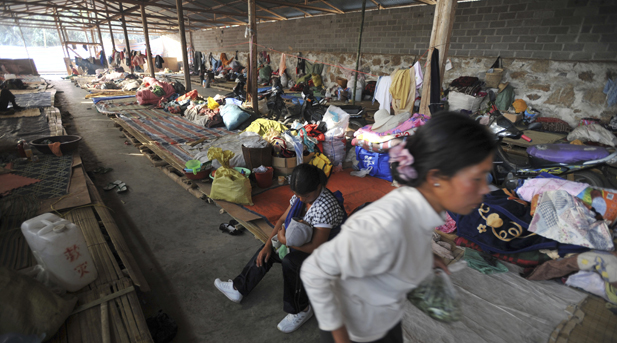When the Burmese army shoots civilians on the streets of Rangoon, there is international outrage and discussions at the United Nations Security Council. When the Burmese army shoots civilians in ethnic states, there is normally silence, and at best calls for “all sides” to stop fighting, ignoring the fact that the Burmese army is the aggressor.
This is a fact that Karen, Karenni and Shan people have known for a long time, as they have been slaughtered and starved by the Burmese army and by aid being blocked. Now the Kachin are suffering the same fate. Even when reports emerged last week of children being killed by the Burmese army, there was silence.
Since the Burmese army broke the ceasefire last June, the abuses committed by the army and the government are so serious that if Burma were a signatory to the Rome Statute, the chief prosecutor of the International Criminal Court would automatically have opened investigations into the actions of President Thein Sein and Gen. Min Aung Hlaing.
Violations of international law by the Burmese army include: the deliberate targeting of civilians with gunfire and mortar bombs; burning homes, churches and entire villages; arbitrary executions; arbitrary detention; rape and sexual violence, including gang-rape and rape against children; torture; land confiscation; looting; and the blocking of humanitarian assistance. Around 70,000 people have fled their homes since the attacks started.
When UN Secretary-General Ban Ki-moon recently visited Burma and gave his speech endorsing the military-dominated Parliament, he didn’t mention these abuses. Instead he said events in Kachin State were “inconsistent” with recent reform efforts. Did he seriously think the Burmese army would stop attacks and allow in aid because they have been told they are being “inconsistent”? We already know the answer. Attacks by the Burmese army have continued, and aid is being blocked again.
On the few occasions since June when the UN has had access to the tens of thousands of internally displaced people in Kachin-controlled areas, they brief media about it and get favorable headlines, but when the government stops them delivering again, they don’t go around briefing media. Ethnic people notice the difference between how much pressure was applied to get access to the Delta after Cyclone Nargis, compared to the low profile and usually low-level efforts to get access to deliver aid to conflict areas in ethnic states.
The current situation in Kachin State, with attacks continuing and aid being blocked, is already unacceptable and in violation of international law. If threatened attacks against Laiza, the headquarters of the Kachin Independence Organisation, do go ahead, it will be an even greater disaster.
Thousands of refugees are sheltering in Laiza. They shelter in old markets and compounds all around the town. Thousands more are in temporary camps on the outskirts of town. Laiza is a town mainly full of civilians, not soldiers.
We know from experience that the Burmese army will not make any effort to avoid injuring civilians. Worse than that, they deliberately attack them. There could be significant civilian casualties, and an even greater humanitarian crisis as people who have already fled their villages once, and are suffering from malnutrition and illness, try to flee again.
What is taking place in Kachin state is already a crisis, and could be about to get much worse, but it isn’t being treated as a crisis. Using words like “inconsistent,” and raising the situation with the government among a list of other talking points, simply isn’t good enough.
Since the reform process started, the international community has talked up positives and played down negatives. This is a policy now costing the lives of Kachin children.
Arguing that we must wait and see what happens with the newly formed peace committee is too risky. If Ban Ki-moon wants to point to inconsistencies, another is the military-backed government setting up a peace committee, while at the same time blocking aid because they are preparing for a new military offensive.
There needs to be concerted and co-ordinated international pressure applied to the government. This is an issue that should be discussed at the United Nations Security Council. As it has done on more than one occasion since the Arab Spring began last year, the Council should issue a statement saying attacking a town full of civilians is unacceptable. It should demand immediate free access for the delivery of humanitarian assistance. Those responsible for abuses must be held to account; there should be justice, and reparations made to the victims of the conflict and abuses.
These are general principles of international law and practice. The international community needs to explain why the Kachin and other ethnic people in Burma don’t deserve the same protection and support as they give to people in other countries. That’s Ban Ki-moon’s own inconsistency.
Zoya Phan is Campaigns Manager at Burma Campaign UK. Her autobiography is published under the title ‘Undaunted’ in the USA, and ‘Little Daughter’ in the rest of the world. This opinion piece does not necessarily represent the editorial standpoint of The Irrawaddy.
















